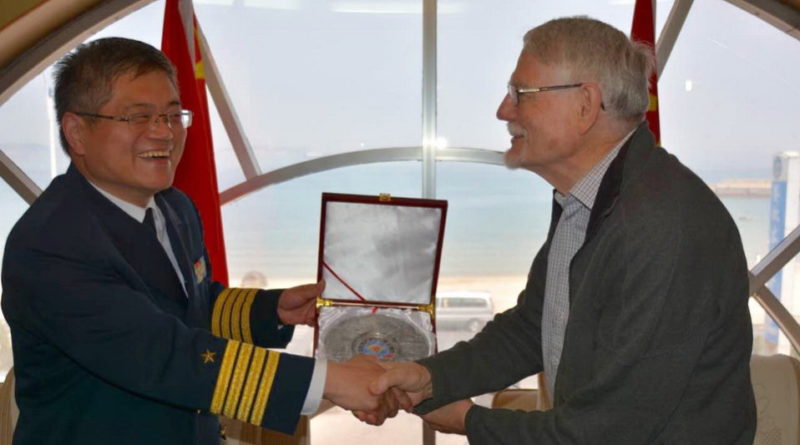Visit Yantai Chefoo School 2016
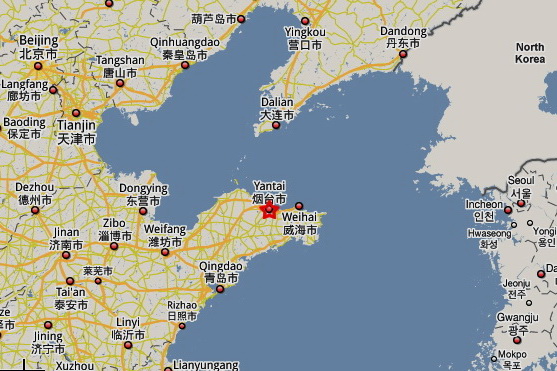 I had an amazing visit to Yantai (Shandong Province) in late April, 2016. It all started with a simple plan but before it was over I felt I had been on a new adventure in East/West relations.
I had an amazing visit to Yantai (Shandong Province) in late April, 2016. It all started with a simple plan but before it was over I felt I had been on a new adventure in East/West relations.
My interest and contacts with Yantai started close to 30 years earlier with friendships back in Canada. Two Chinese students and brothers, Li Xin and Li Min, were frequent visitors in our home. Yantai was their hometown; it was one of the first Chinese cities I could locate on a map.
With my yearly travels to China, I’ve been back in touch with Li Xin, now a successful businessman in Shanghai. His younger brother, Li Min whom we had officially sponsored as a visa student, is now a professor in California. Over these years we had often heard of their father, respected not only as a widowed father of two sons, but also for his significant contribution to China as a physicist.
My adventure this time started with an email to Li Xin, asking if it would be appropriate to stop in Yantai to meet his father. I had just a few days free before my flight home to Canada. Li responded generously, confirming that his father would be pleased to meet me. Further, since it was the May 1 holiday weekend he would be free to travel back to Yantai to see me. Then he said, “Ron, do you remember our discussions about the old Chefoo School in Yantai? Maybe, when you come, we can try to find those old historic buildings.”
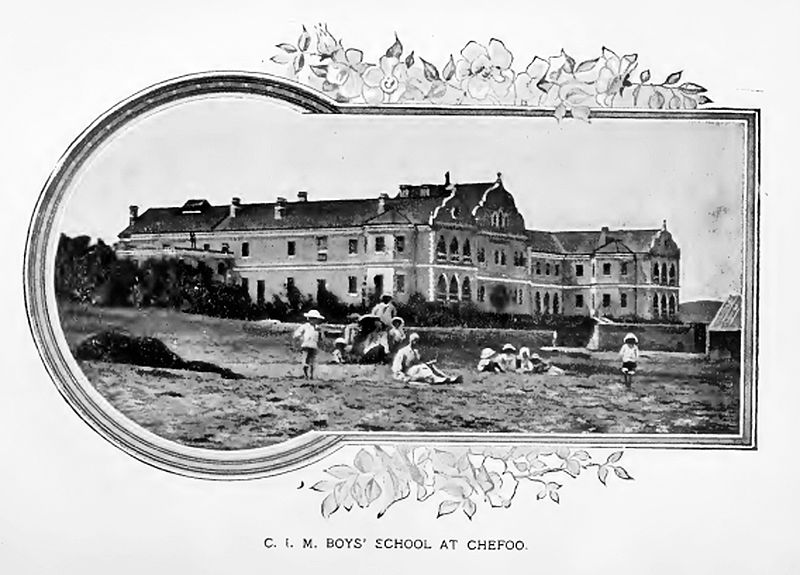 In recent years I’ve enjoyed time each year at a Chinese university. On the side, I’ve developed an interest in places and events that are part of the early history of Westerners in China. In this way I had learned of the Chefoo School in Yantai and something of its history.
In recent years I’ve enjoyed time each year at a Chinese university. On the side, I’ve developed an interest in places and events that are part of the early history of Westerners in China. In this way I had learned of the Chefoo School in Yantai and something of its history.
The school had been founded in 1881 during colonial times as a school for children of missionaries and other English-speaking foreigners in China. During a span of more than 60 years it provided quality university entrance to the best schools in Britain and America. Given my upbringing in a religious tradition that valued missionary activity, I had enjoyed stories of adventurous people such as Dr. James Hudson Taylor (1832-1905) who felt “called by God” to share the teachings of Christianity with people in distant lands. As founder and leader of a major Christian missionary organization, Taylor was rather unique and creative, breaking with many traditions of his time. While clearly enjoying privileges as a foreigner in China during colonial times, he was certainly not in agreement with all the policies of his own British government. I arrived in Yantai with keen interest in learning more about the famous Chefoo School founded by Taylor and his China Inland Mission.
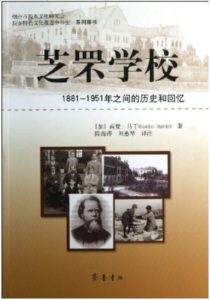 Meanwhile the Li family in Yantai had also been following this history. Li Xin sent me the cover image of a recent publication, a Chinese translation of a book about Chefoo School written by a former teacher, Gordon Martin. I was asked if I knew of it, and soon we had ideas of exploring this bit of East/West history together.
Meanwhile the Li family in Yantai had also been following this history. Li Xin sent me the cover image of a recent publication, a Chinese translation of a book about Chefoo School written by a former teacher, Gordon Martin. I was asked if I knew of it, and soon we had ideas of exploring this bit of East/West history together.
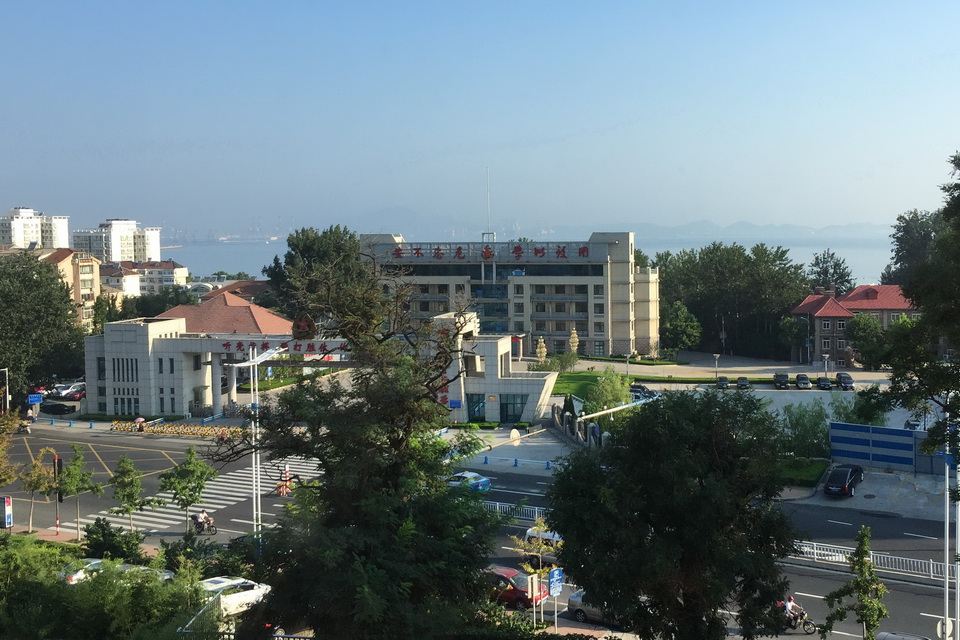 However there was a problem. The old school buildings were almost impossible to visit. They were on the grounds of a military college and, as a foreigner, I would have difficulty entering the site. Luckily, Li Xin was a native of this community and knew whom to talk to. We first chatted about this just a week or so prior to my proposed visit. Plans would need to develop quickly to have any chance of success.
However there was a problem. The old school buildings were almost impossible to visit. They were on the grounds of a military college and, as a foreigner, I would have difficulty entering the site. Luckily, Li Xin was a native of this community and knew whom to talk to. We first chatted about this just a week or so prior to my proposed visit. Plans would need to develop quickly to have any chance of success.
The short version of the story that followed is that the college did become interested in the history of buildings on its campus and agreed to allow this foreigner to give a lecture to the students. If arrangements could be made quickly, the lecture would be the key to gaining access to the historic buildings on site of this military academy. Many things needed to be done in the next four days. It was a topic of some historical and political sensitivity since the school had operated during colonial times. I prepared and submitted my credentials and started producing a PowerPoint lecture on the history of the school.
Meanwhile, what started out as a plan to visit Mr Li Senior was not lost in all of this.
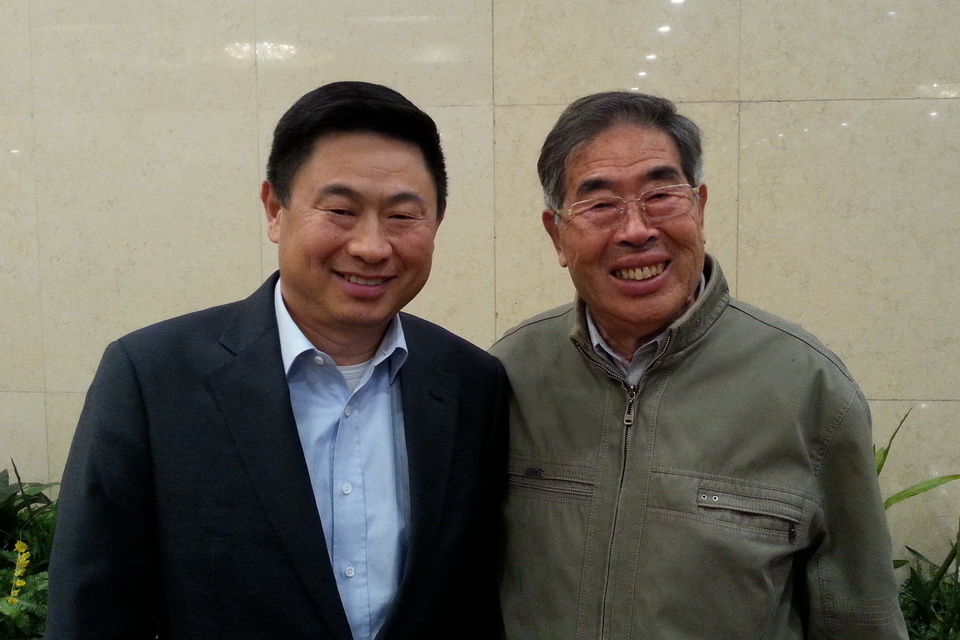
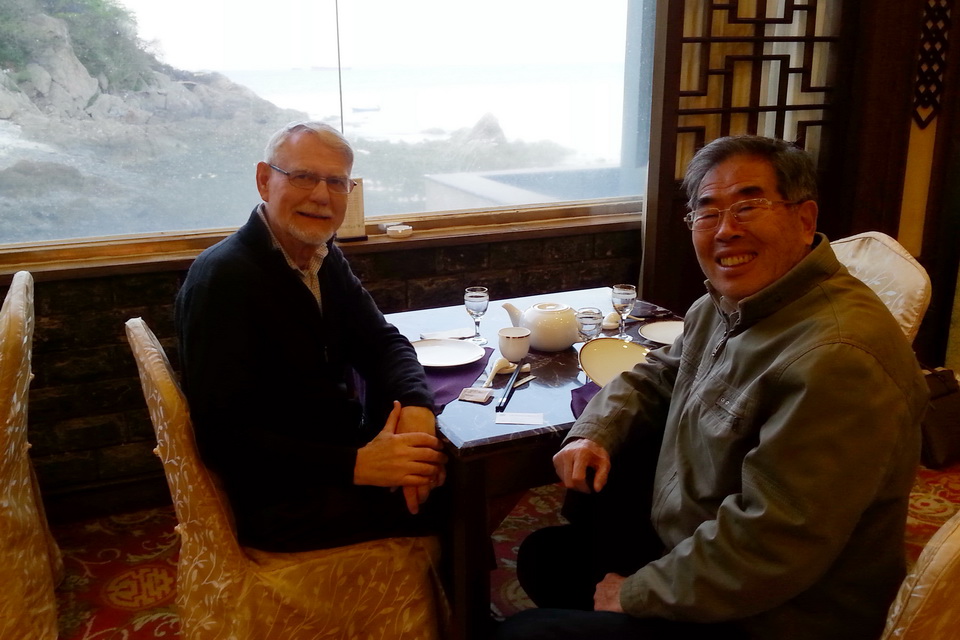 On my arrival in Yantai, Li Xin arranged for a lovely meal together in the Golden Gulf Hotel. Mr Li Senior welcomed me graciously and with much better English than I had expected. At the age of 80 he continues to participate actively in his professional life. He presented me with a beautiful block of acrylic plastic within which was laser-etched a copy of the Chefoo School crest. It was an amazing gift.
On my arrival in Yantai, Li Xin arranged for a lovely meal together in the Golden Gulf Hotel. Mr Li Senior welcomed me graciously and with much better English than I had expected. At the age of 80 he continues to participate actively in his professional life. He presented me with a beautiful block of acrylic plastic within which was laser-etched a copy of the Chefoo School crest. It was an amazing gift.
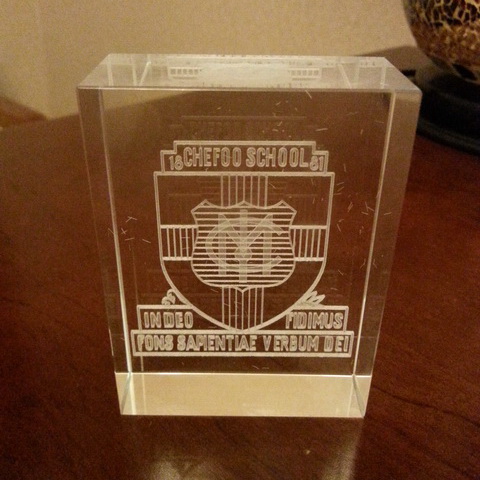 The image had been copied from the history book previously mentioned. Laser technology had been a primary research interest for Mr Li. The etching of the school crest, so beautifully done, was a fitting memorial both to our time together that evening and to the famous school that was the object of our research explorations into East/West history.
The image had been copied from the history book previously mentioned. Laser technology had been a primary research interest for Mr Li. The etching of the school crest, so beautifully done, was a fitting memorial both to our time together that evening and to the famous school that was the object of our research explorations into East/West history.
Returning to the story of the lecture, we had indeed received official approval to proceed and my lecture materials were properly submitted in advance. At the appointed time we were met at the college gates by officers in military uniforms and were taken to a lecture theatre where perhaps 150 uniformed students and staff awaited a lecture by this foreign professor.
The story of how the day unfolded is best told with the following photo essays:
Album: Lecture at Site of Historic Chefoo School
Album: Tour of the Old Chefoo School Buildings
Blog: The surprising follow-up event two years later (A Chefoo School Homecoming)
First published: 2016/07/09
Latest revision: 2021/04/20
